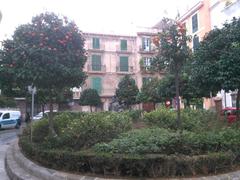Comprehensive Guide to Visiting Biržos tiltas, Klaipeda City, Lithuania
Date: 23/07/2024
Introduction
Biržos tiltas, also known as the Chain Bridge, is a landmark of immense historical and cultural significance in Klaipeda, Lithuania. Constructed in 1826, this bridge stands as a testament to 19th-century engineering prowess and has played a pivotal role in the city’s economic and social development. Originally built to facilitate trade and transportation across the Dane River, Biržos tiltas has witnessed various phases of destruction and reconstruction, most notably during World War II (Klaipeda Tourism). Its unique architectural design, featuring iron chains and massive stone pillars, has made it a marvel of both functionality and aesthetic appeal. Today, the bridge is not only a vital piece of infrastructure but also a cultural icon, hosting numerous events and festivals that celebrate Klaipeda’s rich maritime heritage. This comprehensive guide aims to provide visitors with essential information on visiting hours, tickets, travel tips, and nearby attractions, ensuring a memorable experience at Biržos tiltas.
Table of Contents
- Introduction
- Historical Background
- Modern Era and Preservation Efforts
- Cultural and Social Impact
- Recent Developments and Practical Information
- FAQ
- Conclusion
- References and Further Reading
Historical Background
Origins and Early History
Biržos tiltas was originally constructed in 1826 to facilitate trade and transportation across the Dane River, which bisects the city of Klaipeda. The bridge connected the old town with the newer parts of the city, playing a pivotal role in the region’s economic and urban development.
Architectural Significance
The bridge’s initial design was a chain suspension bridge, a relatively novel concept in the early 19th century. The use of iron chains allowed for a longer span and greater flexibility, making it both functional and aesthetically pleasing. Prominent engineers of the era oversaw its construction, ensuring its durability and resilience.
Role in Trade and Commerce
Throughout the 19th and early 20th centuries, Biržos tiltas was crucial for economic development. It facilitated the movement of goods and people, making it easier for merchants to transport their wares to and from Klaipeda’s bustling markets. As a significant port city, Klaipeda relied heavily on such infrastructure to maintain its commercial hub status.
World War II and Reconstruction
World War II had a profound impact on Biržos tiltas, causing significant damage. Post-war reconstruction efforts aimed to restore the bridge while incorporating modern engineering techniques to enhance its structural integrity.
Modern Era and Preservation Efforts
In the latter half of the 20th century and into the 21st century, Biržos tiltas has continued to symbolize Klaipeda’s rich history and cultural heritage. Various renovations have been undertaken to preserve its historical significance and ensure public safety, supported by local authorities and international organizations.
Cultural and Social Impact
Biržos tiltas is a cultural icon in Klaipeda, serving as the backdrop for numerous cultural events, festivals, and public gatherings. It symbolizes unity and continuity, holding a special place in the hearts of the city’s residents.
Recent Developments and Practical Information
Visiting Hours and Tickets
Biržos tiltas is open to the public year-round. There are no specific visiting hours or ticket requirements, making it easily accessible for all.
Travel Tips and Accessibility
The bridge is located in the heart of Klaipeda and is easily accessible by foot, bicycle, or public transport. Nearby attractions include the Klaipeda Old Town, the Castle Museum, and the Dane River Promenade.
Special Events and Guided Tours
Throughout the year, various events and guided tours are organized to celebrate the bridge’s historical significance. Check the Klaipeda Tourism Information Center for the latest updates on events and tours.
Photographic Spots
Biržos tiltas offers numerous photographic opportunities, particularly at sunset or when illuminated at night. The picturesque views of the bridge and the surrounding cityscape are perfect for capturing memorable moments.
FAQ
What are the visiting hours for Biržos tiltas? Biržos tiltas is open to the public year-round with no specific visiting hours.
How much are tickets for Biržos tiltas? There are no tickets required to visit Biržos tiltas.
What are some nearby attractions? Nearby attractions include Klaipeda Old Town, the Castle Museum, and the Dane River Promenade.
Are there guided tours available? Yes, guided tours are available. Check the Klaipeda Tourism Information Center for updates.
Conclusion
Biržos tiltas stands as a testament to Klaipeda’s resilience and rich history. Whether you’re a history enthusiast, a cultural explorer, or simply looking for a picturesque spot, a visit to Biržos tiltas is a must. For more information and updates, visit the Klaipeda Tourism Information Center. By following the tips and information provided in this guide, you are sure to have a memorable visit to one of Klaipeda’s most iconic landmarks.



